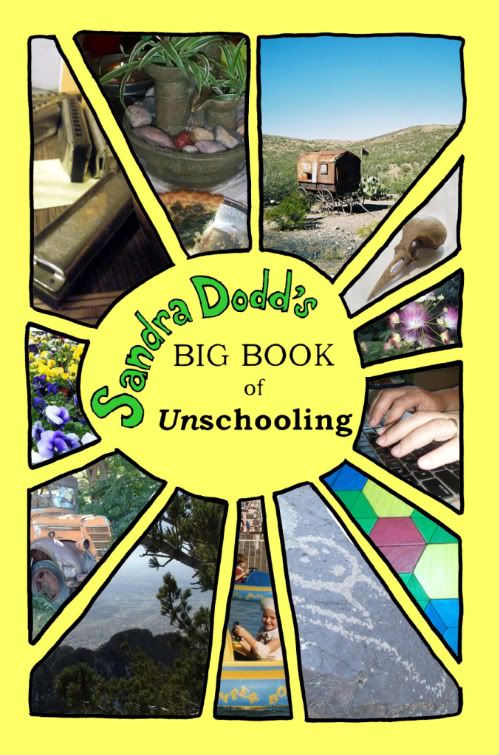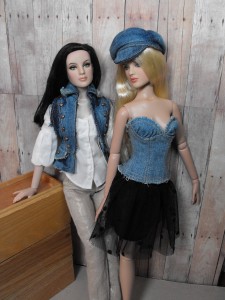A mom and her daughter discover that learning is as natural as breathing
by Miriam Shepard-O’Mahony

When I left Katy at school on her first day of kindergarten in 2003, I walked home in tears. I was crying for the idyllic years of her early childhood that I thought I’d never experience again. We woke when we felt like it and followed our own bliss each day. Katy was learning from playing and pretending, coloring, watching movies and TV shows, and listening to me read aloud. She was never bored and was a bright, cheerful little person. If I had known that day what the experience of school would do to her spirit, I would have been crying for another reason.
Six years later, I found myself filling out the forms to remove Katy from school. Two years previously, the school system had labeled her as learning disabled because she wasn’t reading and doing math on grade level. They had placed her in special education classes, which were accomplishing nothing. Katy would be moving on to middle school that fall, and I was sure that if she remained in special ed she would lose all of her will to learn. Although I had taught high school and college, the prospect of teaching my own child made me feel nervous. Nevertheless, it was a relief to say goodbye to the soul-shriveling mentality of the public school system that had transformed my cheerful 4-year-old into a miserable, school-hating 10-year-old.
Up to that point, I had never considered homeschooling, but my options had run dry. (We had tried a rigorous tutoring program that improved Katy’s reading skills, but she hated every minute of it.) That summer, I would do my research and explore how to go about homeschooling in the fall.
I’d been an at-home mom since Katy was born, so I thought that the transition to homeschooling would not be a dramatic life change for me. However, when Katy was in school, I’d use those seven hours to hone a craft that had fascinated me for years: designing and sewing haute couture for fashion dolls. My work had been shown in doll and craft magazines, and I was selling my designs on eBay. I was making a name for myself in the doll collecting community. While my daughter’s welfare came first, I had more than a twinge of self-pity when I anticipated giving up my creative work to homeschool come September.
When I pictured myself homeschooling, I imagined that I’d transform into teacher/mom at around 9 am, and Katy would cheerfully sit at the dining room table, do worksheets, and read textbooks. But within the first week of homeschooling that autumn in 2009, I discovered that the “school-at-home” model was not going to work for us: Katy ran from the room crying hysterically after I’d attempted a lesson on subtraction.
While talking to Katy later when we were calmer, I realized that her self-esteem had been damaged in school beyond anything I’d imagined. Everything “schoolish” filled her with loathing. Home had always been a haven; now it seemed as if school had invaded her home and her mother, and there would be no escape. I knew it would be impossible to teach her anything unless I used force, which I was not willing to do.

At this pivotal point in Katy’s and my life, I came across the philosophy of “unschooling” and the writings of home education advocate Sandra Dodd. Unschooling revealed a way to respect Katy’s interests and skills and put me in the role of learning facilitator and partner rather than authoritarian instructor/antagonist. Unschooling is often described as “peaceful parenting.”
A key principle of unschooling is that learning is something we do all the time and is as natural as breathing. Whenever our imagination and interest is engaged by new information or skills, we are learning. It doesn’t just happen in school, and it doesn’t have to be divided into academic subject areas. It doesn’t even require teachers.
Unschooling parents encourage their children to pursue their interests and live according to their own schedule, without formal lessons. There is a strong emphasis on respecting your child and thinking of him or her as a person, not as a different form of human life that you can coerce. Since I had a bright, independent child who did not respond to traditional didactic methods, I thought that this approach would work for us.
Whenever our imagination and interest is engaged by new
information or skills, we are learning. . . .
In the years that have followed, Katy has flourished. She spends hours at the computer exploring Web sites and using art and editing software. I discovered that YouTube isn’t just a place to watch cat videos or Justin Bieber–it is an amazing entertainment and information resource. Katy developed her own taste in music by watching music videos, found how-to videos on a variety of topics, and even learned some Japanese language.
 One of Katy’s favorite things is watching reviews of classic TV shows. She has developed an amazing understanding of plot and character vocabulary as a result. Another passion, watching toy reviews, inspired Katy to create her own reviews on YouTube. She found Japanese Anime on the Internet, which led to her to Manga literature, a popular form of Japanese graphic novels. When she started haunting the Manga shelves at the bookstore, I was delighted: it was just a joy to see her finally reading for pleasure. Most recently, Katy discovered superhero comic books. You’d be surprised at how much she’s learned about World War II, Greek mythology, and the science of DNA and radiation by reading comic books and then asking questions and doing further research on her own.
One of Katy’s favorite things is watching reviews of classic TV shows. She has developed an amazing understanding of plot and character vocabulary as a result. Another passion, watching toy reviews, inspired Katy to create her own reviews on YouTube. She found Japanese Anime on the Internet, which led to her to Manga literature, a popular form of Japanese graphic novels. When she started haunting the Manga shelves at the bookstore, I was delighted: it was just a joy to see her finally reading for pleasure. Most recently, Katy discovered superhero comic books. You’d be surprised at how much she’s learned about World War II, Greek mythology, and the science of DNA and radiation by reading comic books and then asking questions and doing further research on her own.
Today, my 13-year-old daughter and I live a life that is similar to the idyllic existence we had before she entered kindergarten. There is no more nagging Katy to get out of bed, get dressed, breakfasted, and out the door to be in time for school. It doesn’t matter what time she wakes up now, as she has the whole day to learn: her “school” day is her own to shape.
As for me, I discovered that homeschooling allows more time for my creative endeavors than I’d thought possible. Free from the stress and constraints of the daily school schedule, both Katy and I have more energy. And because I allow Katy the time she needs to attend to her own projects and passions, she understands my need to work through a project that has me in thrall.
Free from the stress and constraints of the daily school schedule,
both Katy and I have more energy. . . .
I am no longer the arbiter of Katy’s bedtime. She goes to sleep when she is tired. Usually we end the day together, watching TV shows we both enjoy and talking about what we did that day and what we plan for the next.
There are as many ways to homeschool as there are families. For children who have difficulty functioning in the classroom because of physical or mental differences, children who require individual attention and extra time to figure things out, and children who want to focus on one skill or interest at a time, homeschooling can be a wonderful experience. When you are not spending all your energy trying to comply with the arbitrary academic demands of the school system, but rather focusing on your child’s developing needs and abilities, life gets much simpler and focused. Having my child learning at home has given my husband and me a more peaceful life and a happier child than I would ever have imagined.
| For Further Reading
John Caldwell Holt. How Children Learn (Classics in Child Development). Da Capo Press; 1995. John Holt and Pat Farenga. Teach Your Own: The John Holt Book of Homeschooling. Perseus Publishing, 2003. Sandra Dodd and Pam Sorooshian. Sandra Dodd’s Big Book of Unschooling. Lulu; 2009. John Taylor Gatto and Thomas Moore. Dumbing Us Down: The Hidden Curriculum of Compulsory Schooling. New Society Publishers; 2002. |
Miriam Shepard O’Mahony has a BA in English from Hofstra University and an MA in English from Georgetown University. She was working on her PhD dissertation in English at the University of Maryland when she decided she’d rather have a baby than another degree. Her haute couture fashion doll clothing, YumYum couture, has appeared in doll and craft magazines and has earned first prizes in competition. Miriam lives in Maryland with her husband Kevin, daughter Katy, and two cats.
Mother/daughter photo: © Avava | Dreamstime.com; doll photo courtesy Miriam Shepard O’Mahoney






What a wonderful turn of events for both Miriam and Katy! I am sure that it depends on the quality of the parent as well as the child, as to the outcome, but it is evident that Miriam and Katy are the perfect subjects to attempt what could be a very difficult lifestyle…and make it work. I don’t know if I would have had enough knowledge (or patience) to try something like this.. Congratulations to both of you, Miriam and Katy.. Good Job! 🙂
Lovely article!